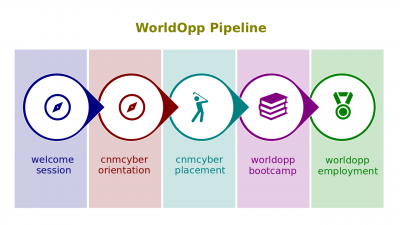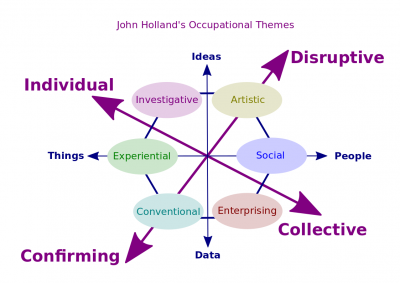Difference between revisions of "Nature of Occupations"
(→Summary) |
(→Overview) |
||
| Line 8: | Line 8: | ||
===Overview=== | ===Overview=== | ||
| − | Welcome to ''Nature Of Occupations''. In this brief presentation, we are going to take a look at natures of various occupation and the most popular attempt to classify them called [[Holland Occupational Themes]]. | + | Welcome to ''Nature Of Occupations''. In this brief presentation, we are going to take a look at natures of various occupation and the most popular attempt to classify them called [[Holland Occupational Themes]]. Let's go ahead. |
:[[File:Holland-themes.png|400px|thumb|[[Holland Occupational Themes]]]]'''[[Occupation]]'''. The regular activity that a person undertakes in order to earn his or her livelihood. That activity can be a job, profession, or position that somebody works in. Entrepreneurs may refer their [[occupation]] as [[self-employed]].<div style="background-color:#efefef; padding: 5px; margin: 15px;"> | :[[File:Holland-themes.png|400px|thumb|[[Holland Occupational Themes]]]]'''[[Occupation]]'''. The regular activity that a person undertakes in order to earn his or her livelihood. That activity can be a job, profession, or position that somebody works in. Entrepreneurs may refer their [[occupation]] as [[self-employed]].<div style="background-color:#efefef; padding: 5px; margin: 15px;"> | ||
Revision as of 16:16, 26 January 2019

Nature Of Occupations is the second presentation in the Introduction to Employment lecture. The lecture itself is the second in WorldOpp Orientation. Consequently, the Orientation is the first stage of WorldOpp Pipeline.
This wikipage presents its full script and those test questions that are related to that presentation.
Script
The video of the presentation is published at https://youtu.be/bVNQOFVsPyQ (6:09). Here is its full text.
Overview
Welcome to Nature Of Occupations. In this brief presentation, we are going to take a look at natures of various occupation and the most popular attempt to classify them called Holland Occupational Themes. Let's go ahead.
- Occupation. The regular activity that a person undertakes in order to earn his or her livelihood. That activity can be a job, profession, or position that somebody works in. Entrepreneurs may refer their occupation as self-employed.
- Experiential occupation (realistic occupation, motoric occupation). An occupation that frequently involves work activities that include practical, hands-on problems and solutions. They often deal with plants, animals, and real-world materials like wood, tools, and machinery. Many of the occupations require working outside, and do not involve a lot of paperwork or working closely with others. Examples of that type of occupations may include a carpenter, engineer, farmer, and tester. Collectively, they may be called "doers;" in ancient times, they would have been hunters.
- Investigative occupation (intellectual occupation). An occupation that frequently involves working with ideas and requires an extensive amount of thinking. These occupations can involve searching for facts and figuring out problems mentally. Examples of that type of occupations may include an auditor, business analyst, compliance officer, cost estimator, editor, inspector, interviewer, and lawyer. Collectively, they may be called "thinkers;" in ancient times, they would have been shamans.
- Artistic occupation (esthetic occupation). An occupation that frequently involves working with forms, designs and patterns. They often require self-expression and the work can be done without following a clear set of rules. Examples of that type of occupations may include an artist, composer, designer, enterprise architect, and creative writer. Collectively, they may be called "innovators;" in ancient times, they would have been artisans.
- Social occupation (supportive occupation). An occupation that frequently involves working with, communicating with, and teaching people. These occupations often involve helping or providing service to others. Examples of that type of occupations may include a career counselor, job coach, mediator, sales representative, and teacher. Collectively, they may be called "helpers;" in ancient times, they would have been healers.
- Enterprising occupation (persuasive occupation). An occupation that frequently involves starting up and carrying out projects. These occupations can involve leading people and making many decisions. Sometimes they require risk taking and often deal with business. Examples of that type of occupations may include an architect, product owner, and self-employed. Collectively, they may be called "creators;" in ancient times, they would have been leaders.
- Conventional occupation (conforming occupation). An occupation that frequently involves following set procedures and routines. These occupations can include working with data and details more than with ideas. Usually there is a clear line of authority to follow. Examples of that type of occupations may include an accountant, administrative assistant, bookkeeper, document management specialist, and technical writer. Collectively, they may be called "organizers;" in ancient times, they would have been guardians.
What an occupation is
Occupation is a regular activity that a person undertakes in order to earn his/her livelihood. Occupation theme can be defined as the unifying subject of the type of an occupation. The subject impacts preferences for work environments and outcomes. Here there is no any single classification of different things or types of occupations. The most popular came from the works of an American psychologist John Holland. He tried to match occupations with personalities and he studied personalities first and he found that some personalities are more disruptive, some are more conforming, some are more individual, some are more collective and he chunked personality types in six buckets which are artistic, social, enterprise, conventional, experiential and investigative. Every personality has not only one dimension but could be two or more and as the personality classification didn`t really work but for occupations basically became the most popular classification.
Starting with Experiential potential. Initially drawn a horn called it motoric occupation and later he changed it to realistic occupation. Evidential potential is any occupation that frequently involves work activities that include practice hands on problems and solutions and in this bucket came a carpenter, engineer, farmer etc. Collectively they may be called doers, in ancient times they would have been hunters. Investigative occupations which John Holland initially called intellectual is an occupation that frequently involves working with ideas that requires an extensive amount of thinking. In this bucket goes an auditor, business analyst, compliance officer, cost estimator, editor, inspector, interviewer and a lawyer. Collectively they may be called thinkers.
In artistic occupation, initially known as esthetic occupation is the occupation that frequently involves working the forms, designs and patterns. In this bucket will go an artist, composer, designer, enterpriser, architect and a creative writer. Collectively they may be called innovators. In ancient times they would have been artisans. Social occupation or initially it was called supportive, is an occupation that frequently involves working with and communicating with and teaching people. This occupation often involves helping or providing services to others. In this bucket will go a carrier councilor, job coach, sales representative and teacher. Collectively they may be called helpers and in ancient times they could be deemed healers.
Enterprise Occupation, initially it was called persuasive occupation. It is an occupation which frequently involves starting up and carrying out projects. In this bucket will go an architect, project owner and self-employed. Collectively they may be called creators and in ancient times they would have been leaders. Finally, Conventional Occupation, initially known as conforming. This is an occupation that frequently involves following set procedures and routines. In this bucket will go an accountant, administrative assistant, book keeper, document management specialist and technical writer. Collectively they may be called organizers. In ancient times they would have been guardians.
Here are two different sets of dimensions, one is working ideas verses data and people verses things and clearly social works more with people and experiential or realistic work more with things. Ideas, we have artistic and investigative. So artistic basically create ideas and investigative find ideas or find what`s there behind the ideas and data. Enterprise and conventional, interestingly enterprising is not in ideas, enterprising is between people and data. It’s more of persuasive, working with people and data. That’s it for occupational themes. Next we will look at conditions of work.
Summary
- This concludes the Nature Of Occupations presentation. We have taken a look at [[]]. If you haven't done yet so, you are now welcome to move to Work Environments.
Quiz questions
- Every statement below is split into one true and one false question in the actual exam.
See also
- Work Environments. The third presentation in Introduction to Employment.
- Employment Essentials. The first presentation in Introduction to Employment.

